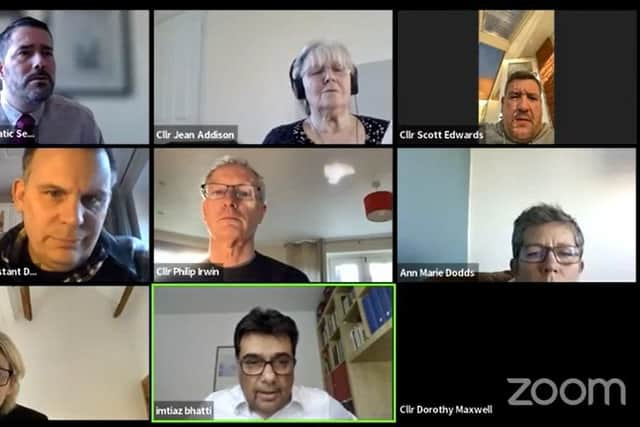North Northamptonshire's 'missing' kids - the children who don’t go to school


A team of ‘tracking officers’ dedicated to getting pupils ‘missing’ from education back into school has outlined how it’s helping 110 kids in the north of the county.
In North Northamptonshire there are 110 youngsters classed as ‘Children Missing from Education’ – although that number fluctuates during the year. At the end of September last year there were 226.
Advertisement
Hide AdAdvertisement
Hide AdThese are pupils that have gone missing from schools and the education authority doesn’t know where they are. They are also pupils that never attend school, suddenly stop attending schools, or are withdrawn by parents who aren’t home educating them. Some fail to transition from primary to secondary or from one school to another.


They must be missing for ten days before officially being classed as missing from education.
A specialist council team monitors these children as well as those receiving home education.
Manager Imtiaz Bhatti spoke to members of the NNC’s Future Communities Executive Advisory Panel about his team’s work at a meeting this week.
Advertisement
Hide AdAdvertisement
Hide AdHe said: “The local authority has a duty to locate, track and monitor children missing from education and support them in returning to education.
“We try and track them so that they are not lost to the system.”
“The list doesn’t include truants, or those that we know where they are, or pupils that we know they’re not in school because the parents has decided to teach them at home."
The team works closely with other bodies including the authority’s own Children’s Trust, the police, the Multi-Agency Safeguarding Hub (MASH) and HMRC that can help find those who may be in receipt of benefits.
Advertisement
Hide AdAdvertisement
Hide AdMr Bhatti said: “Our databases are aligned so we know any pupils who are on the children’s trust list. As soon as we know they’re missing we start liaising with a social worker to make sure that the pupils are kept under their eye we can try and find them as soon as possible. Those pupils are inevitably those that are most vulnerable.”
If missing pupils are already known to social services then the team first tries to find the child but would then inform MASH at an early stage to ensure they are safe.
Councillors were shown a snapshot from the end of September 2022, when 226 children belonging to 164 families were missing from education. Of those, eight had existing social care involvement.
Thirty one of them were found to be outside of the UK, with some visiting family for extended periods.
Advertisement
Hide AdAdvertisement
Hide AdForty had moved into Northants but had previously been classed as missing from education in different counties. And 32 had moved to a different county.
Mr Bhatti said: “One of the times of the year the number is far higher is at the end of that first month (September). During the summer holidays when they’re not at school things might have happened and they might get reported on during the month and those numbers go through the roof.”
“We’ve currently got about 110.”
When children move out of the county they are still monitored until Northants knows they’re in a school.
Mr Bhatti’s team also looks after those children who are electively home educated – this is when parents take on the responsibility of providing an education for their child.
Advertisement
Hide AdAdvertisement
Hide AdThere are currently 615 HE children in North Northants, up from 582 the previous year – with 16 of them known to social services.
There are no legal requirements in terms of what home education is and parents don’t have to have the same holidays as school or follow the same curriculum.
Every home educator has to submit a home education plan to the local authority.
Mr Bhatti said: “It we’re not satisfied with that plan we can issue a school attendance order to get the child back into school.”
Advertisement
Hide AdAdvertisement
Hide Ad"Some of these families do not like involvement by the local authority.”
The department is currently prosecuting the two parents who didn’t submit a home education plan and are in breach of school attendance orders.
Some councillors at the meeting raised concerns over vulnerable children.
Cllr Philip Irwin (Con, Croyland and Swanspool) said: “It’s a massive red flag if a child who has been on a safeguarding register suddenly is no longer at school which is where you’d expect children to be revealing if there are things going on at home.
“I would have thought you’d inform MASH?”
Advertisement
Hide AdAdvertisement
Hide AdMr Bhatti confirmed that MASH would be informed straight away if a vulnerable child is missing from education.
Cllr Dorothy Maxwell (Con, Irthlingborough) asked why parents were allowed to take their children on long visits abroad. She said: “Some parents feel that they can take them out of school for three months not realising the implications of being out of education. They’ve then gone and missed a large chunk of the curriculum.”
Mr Bhatti replied: “The parents will turn around and say that’s a cultural experience, that’s an education in itself.
“We can try and push that as much as we can but parents will make their own choice.”
Advertisement
Hide AdAdvertisement
Hide AdCllr Jean Addison (Lab, Corby West) asked: “What checks are done around parents’ motivation for home educating? They may be home educating but not necessarily for the benefit of children."
Mr Bhatti said: “We are very aware that we need to make sure the parents have the ability to be able to support the children. In terms of the reason, they have to write us a letter letting us know they’re going to do this and we have to think their home education plan is acceptable.
"If we don’t think it’s acceptable we issue a school attendance order. We have done that in the past to say we don’t think you have the ability based on the education you are proposing for the child.
"We do everything we can to make sure they’re doing it for the right reason.”
